Monthly Updates on Recent Books in the History of Christianity
To raise awareness of recent books in the history of Christianity, the editorial staff of Church History: Studies in Christianity and Culture highlights each month a list of 10-15 books in diverse periods and geographical regions that we hope will be of interest to our members. We include here below the 41st monthly list, chosen by our staff, with excerpts from the publishers’ blurbs.
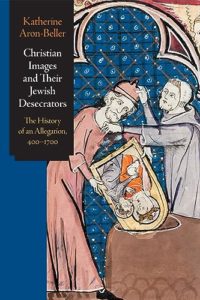
Katherine Aron-Beller, Christian Images and Their Jewish Desecrators: The History of an Allegation, 400-1700. 2024
University of Pennsylvania Press
In Christian Images and Their Jewish Desecrators, Katherine Aron-Beller examines European tales, myths, and fantasies about Jewish desecration of Christian images. She argues that this trope must be considered alongside more well-known antisemitic allegations to understand how anti-Jewish attitudes impacted Jewish individuals and communities.
In Christian Images and Their Jewish Desecrators, historian Katherine Aron-Beller analyzes the common Christian charge that Jews habitually and compulsively violated Christian images, identifying this allegation as one that functioned alongside other anti-Jewish allegations such as ritual murder, blood libel, and host desecration to ultimately inform dangerous and long-lasting prejudices in medieval and early modern Europe.
Through an analysis of folk tales, myths, legal proceedings, and religious art, Aron-Beller finds that narratives alleging that Jews committed violence against images of Christ, Mary, and the disciples flourished in Europe between the fifth and seventeenth centuries. She then explores how these narratives manifested differently across the continent and the centuries, finding that their potency reflected not Jewish actions per se, but Christians’ own concerns about slipping into idolatry when viewing depictions of religious figures. In addition, Aron-Beller considers Jews’ own attitudes toward Christian imagery and the ways in which they responded to and rejected—or embraced—such allegations. By examining how desecration allegations affected Jewish individuals and communities spanning Byzantium, medieval England, France, Germany, and early modern Spain and Italy, Aron-Beller demonstrates that this charge was a powerful expression of the Christian majority’s anxiety around committing idolatry and their eagerness to participate in practices of veneration that revolved around visual images—an anxiety that evolved through the centuries and persists to this day.
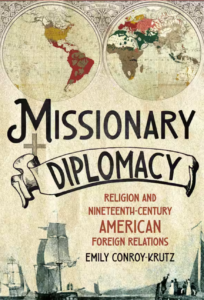
Emily Conroy-Krutz, Missionary Diplomacy: Religion and Nineteenth-Century American Foreign Relations. 2024
Missionary Diplomacy illuminates the crucial place of religion in nineteenth-century American diplomacy. From the 1810s through the 1920s, Protestant missionaries positioned themselves as key experts in the development of American relations in Asia, Africa, the Pacific, and the Middle East. Missionaries served as consuls, translators, and occasional trouble-makers who forced the State Department to take actions it otherwise would have avoided. Yet as decades passed, more Americans began to question the propriety of missionaries' power. Were missionaries serving the interests of American diplomacy? Or were they creating unnecessary problems?
As Emily Conroy-Krutz demonstrates, they were doing both. Across the century, missionaries forced the government to articulate new conceptions of the rights of US citizens abroad and of the role of the US as an engine of humanitarianism and religious freedom. By the time the US entered the first world war, missionary diplomacy had for nearly a century created the conditions for some Americans to embrace a vision of their country as an internationally engaged world power. Missionary Diplomacy exposes the longstanding influence of evangelical missions on the shape of American foreign relations.
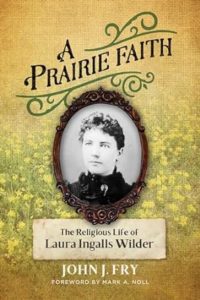
John J. Fry, A Prairie Faith: The Religious Life of Laura Ingalls Wilder. 2023
The beloved Little House books by Laura Ingalls Wilder have sold over 60 million copies since their publication in the first half of the twentieth century. Even her unpolished memoir, Pioneer Girl, which tells the true story behind the children’s books, was widely embraced upon its release in 2014. Despite Wilder’s enduring popularity, few fans know much about her Christian beliefs and practice.
John J. Fry shines a light on Wilder’s quiet faith in this unique biography. Fry surveys the Little House books, Pioneer Girl, and Wilder’s lesser-known writings, including her letters, poems, and newspaper columns. Analyzing this wealth of sources, he reveals how Wilder’s down-to-earth faith and Christian morality influenced her life and work. Interweaving these investigations with Wilder’s perennially interesting life story, A Prairie Faith illustrates the Christian practices of pioneers and rural farmers during this dynamic period of American history.
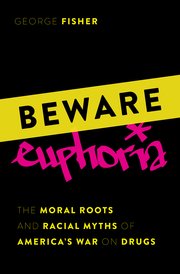
George Fisher, Beware Euphoria: The Moral Roots and Racial Myths of America's War on Drugs. 2024
Beware Euphoria uncovers the roots of America's moral obsession with drug regulation, offering a lively and fascinating history of the nation's racialized fear of intoxication. Challenging the idea that early antidrug laws in the US arose from racial animus, George Fisher instead shows in textured detail how US drug laws were driven by a deep-seated cultural taboo against euphoria and a preoccupation with white moral integrity.
From nineteenth-century opium dens to the war on cocaine and cannabis, and more, Fisher offers a vivid tour of the sites of conflict, along with a convincing case for how the moral discourses and social contexts of the day pit drugs against the law. Bringing this history up to the present, Fisher shows how the racial dynamic has changed dramatically. As harsher penalties swell prisons with mostly nonwhite dealers, antidrug laws have come under renewed scrutiny as a tool of racial oppression. The book closes with an examination of cannabis legalization, driven in part by the movement for racial justice.
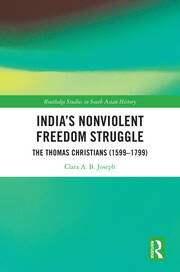
Clara A. B. Joseph, India’s Nonviolent Freedom Struggle: The Thomas Christians (1599-1799). 2024
India’s Nonviolent Freedom Struggle is a groundbreaking book that offers a fresh perspective on the Indian freedom struggle. It focuses on the Thomas Christians, a group of Christians in South India who waged a nonviolent struggle against European colonization during the politically volatile period of 1599–1799.
The book has three related objectives and unique characteristics. First, it offers a comprehensive study of primary sources that scholars have referenced but rarely studied in depth. Second, it argues that the Thomas Christian narratives provide a unique position to challenge prevalent estimations found in canonical and postcolonial critical discourse on the nation. Third, the book considers how an account of a nonviolent struggle by Thomas Christians further complicates received ideas of the postcolonial nation.
The book sheds light on the often-overlooked contributions of the Thomas Christians in India’s nonviolent freedom struggle and challenges readers to reimagine the complex and often contentious relationship between colonizers and colonized.
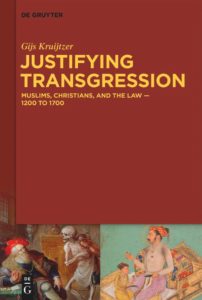
Gijs Kruijtzer, Justifying Transgression: Muslims, Christians, and the Law – 1200 to 1700. 2024
How do people justify what others see as transgression? Taking that question to the Persian-Muslim and Latin-Christian worlds over the period 1200 to 1700, this book shows that people in both these worlds invested considerable energy in worrying, debating, and writing about proscribed practices. It compares how people in the two worlds came to terms with the proscriptions of sodomy, idolatry, and usury. When historians speak of the gap between premodern practice and the legal theory of the time, they tend to ignore the myriad of justifications that filled this gap. Moreover, a focus on justification evens out many of the contrasts that have been alleged to exist between the two worlds, or the Muslim and Christian worlds more generally. The similarities outweigh the differences in the ways people came to terms with the various rules of divine law. The level of flexibility of the theologians and jurists in charge of divine law varied more over time and by topic than between the two worlds. Both worlds also saw the development of ever more sophisticated justifications. Amid the increasing complexity of justifications, a particular kind of reasoning emerged: that good outcomes are more important than upholding rules for their own sake.
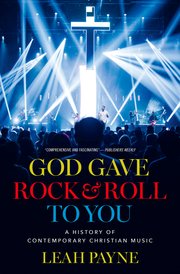
Leah Payne, God Gave Rock and Roll to You: A History of Contemporary Christian Music. 2024
Few things frightened conservative white Protestant parents of the 1950s and the 1960s more than thought of their children falling prey to the "menace to Christendom" known as rock and roll. The raucous sounds of Elvis Presley and Little Richard seemed tailor-made to destroy the faith of their young and, in the process, undermine the moral foundations of the United States. Parents and pastors launched a crusade against rock music, but they were fighting an uphill battle.
Salvation came in a most unlikely form. Well, maybe not that unlikely--the long hair, the beards, the sandals--but still a far cry from the buttoned-up, conservative Protestantism they were striving to preserve. Yet when a revival swept through counterculture hippie communities of the West Coast in the 1960s and 1970s a new alternative emerged. Known as the Jesus Movement--and its members, more colloquially, as "Jesus freaks"--the revival was short-lived. But by combining the rock and folk music of the counterculture with religious ideas and aims of conservative white evangelicals, Jesus freaks and evangelical media moguls gave birth to an entire genre known as Contemporary Christian Music (CCM). By the 1980s and 1990s, CCM had grown into a massive, multimillion-dollar industry. Contemporary Christian artists were appearing on Top 40 radio, and some, most famously Amy Grant, crossed over into the mainstream. And yet, today, the industry is a shadow of what it once was.
In this book, Leah Payne traces the history and trajectory of CCM in America and, in the process, demonstrates how the industry, its artists, and its fans shaped--and continue to shape--conservative, (mostly) white, evangelical Protestantism. For many outside observers, evangelical pop stars, interpretive dancers, puppeteers, mimes, and bodybuilders are silly expressions of kitsch. Yet Payne argues that these cultural products were sources of power, meaning, and political activism. Throughout, she draws on in-depth interviews with CCM journalists, publishers, producers, and artists, as well as archives, sales and marketing data, fan magazines, merchandise--everything that went into making CCM a thriving subculture. Ultimately, Payne argues, CCM spurred evangelical activism in more potent and lasting ways than any particular doctrine, denomination, culture war, or legislative agenda had before.

Matthew Rowley, Godly Violence in the Puritan Atlantic World, 1636-1676: A Study of Military Providentialism. 2024
This book recounts Puritan struggles for military dominance and for an authoritative interpretation of God's agency in war. It asks: What did Puritans say was God's will in warfare; and how did they claim to know? It applies the term 'military providentialism' to this attempt to understand God's will and agency in war; and the term 'godly violence' to an act of killing that was deemed to be both just and holy. The book explores these themes by examining Puritan warfare against four groups: Native Americans, royalist Episcopalians, Irish Catholics and Scottish Presbyterians. It employs a wide range of printed and archival sources: sermons, treatises, official documents, newsbooks, letters, diaries, poems and objects related to material culture; and considers private providential interpretations written by obscure individuals alongside published works by more prominent people. Overall, the book provides a rich analysis of the mindset which sustained Puritan political theology and military action at the time when Puritans were at the height of their power on both sides of the Atlantic.
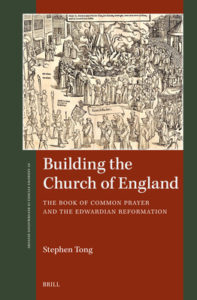
Stephen Tong, Building the Church of England: The Book of Common Prayer and the Edwardian Reformation. 2023
Were mid-Tudor evangelicals roaring lions or meek lambs? Did they struggle with a minority complex, or were they comfortable with their position of political ascendancy under Edward VI? How did their theological blueprint of the ‘True Church’ fit their temporal realities? By relocating the Book of Common Prayer at the centre of the English Reformation, Stephen Tong gives new significance to two underacknowledged drivers of reform: ecclesiology and liturgy. Edwardian reformers caused a sensation in England by engaging with these questions, which spilled over into Ireland, and continued to cast a shadow over subsequent generations of the English Protestants.
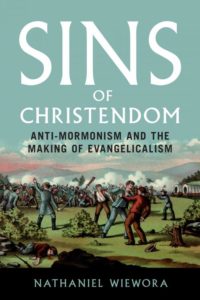
Nathaniel Wiewora, Sins of Christendom: Anti-Mormonism and the Making of Evangelicalism. 2024
Evangelical criticism of the Church of Jesus Christ of Latter-day Saints dates back to the earliest days of the Church. Nathaniel Wiewora uses the diverse animus expressed by evangelicals to illuminate how they used an imaginary Church as a proxy to disagree, attack, compromise, and settle differences among themselves. As Wiewora shows, the evangelical practice to contrast itself with the emerging faith not only encompassed but also went beyond religious matters. If Joseph Smith was accused of muddling religious truth, he and his followers also faced accusations of immoral economic practices and a sinful regard for wealth that reflected worries within the evangelical world. Attacks on Latter-day Saints’ emotional religious displays, the Book of Mormon’s authenticity, and the dangerous ideas represented by Nauvoo paralleled similar conflicts. Wiewora traces how the failure to blunt the Church’s success led evangelicals to change their own methods and pursue the religious education infrastructure that came to define parts of the movement.
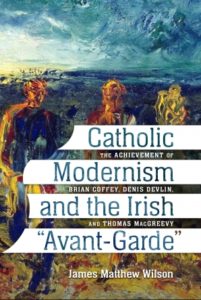
James Matthew Wilson, Catholic Modernism and the Irish “Avant-Garde”: The Achievement of Brian Coffey, Denis Devlin, and Thomas MacGreevy. 2023
Catholic University of America Press
This study constitutes the first-ever definitive account of the life and work of Irish modernist poets Thomas MacGreevy, Brian Coffey, and Denis Devlin. Apprenticed to the likes of W.B. Yeats, T.S. Eliot, James Joyce, and Samuel Beckett, all three writers worked at the center of modernist letters in England, France, and the United States, but did so from a distinctive perspective. All three writers wrote with a deep commitment to the intellectual life of Catholicism and saw the new movement in the arts as making possible for the first time a rich sacramental expression of the divine beauty in aesthetic form. MacGreevy spent his life trying to voice the Augustinian vision he found in The City of God. Coffey, a student of neo-Thomist philosopher Jacques Maritain, married scholastic thought and a densely wrought poetics to give form and solution to the alienation of modern life. Devlin contemplated the world with the eyes of Montaigne and the heart of Pascal as he searched for a poetry that could realize the divine presence in the experience of the modern person. Taken together, MacGreevy, Coffey, and Devlin exemplify the modern Catholic intellectual seeking to engage the modern world on its own terms while drawing the age toward fulfillment within the mystery and splendor of the Church. They stand apart from their Irish contemporaries for their religious seriousness and cosmopolitan openness to European modernism. They lay bare the theological potencies of modern art and do so with a sophistication and insight distinctive to themselves.
Although MacGreevy, Coffey, and Devlin have received considerable critical attention in the past, this is the first book to study their work comprehensively, from MacGreevy’s early poems and essays on Joyce and Eliot to Coffey’s essays in the neo-scholastic philosophy of science, and on to Devlin’s late poetic attempts to realize Dante’s divine vision in a Europe shattered by war and modern doubt.
Finally, for staying up-to-date on the latest titles in all fields, we recommend regularly perusing New Books Network and its "New Books in Christian Studies” page. These pages are updated regularly.
